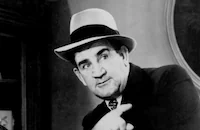Varsity Show

Brief Synopsis
Cast & Crew
William Keighley
Dick Powell
Fred Waring
Ted Healy
Rosemary Lane
Priscilla Lane
Film Details
Technical Specs

Synopsis
The annual Varsity Show at Winfield College is shaping up to be rather dull under the uninspired direction of Professor Sylvester Biddle. In order to save the show and the Quadrangle Club that it supports, the students raise some money and approach former student, and current Broadway producer, Chuck Daly, with a request to take over the reins. As his last season has been disastrous, Daly agrees and arrives at Winfield with his manager, William Williams. Biddle has his own ideas, however, and refuses to let Chuck take over. Chuck is about to leave when he hears Barbara Stewart sing at the dance that evening. He is immediately attracted to Babs, as she is known, and he decides to stay. The students work with Chuck, but Biddle will stop at nothing to get rid of him. When the students try to give Biddle the mumps, he retaliates by giving a special exam that all the students manage to pass with the help of Betty Bradley, the smartest student on campus. Eventually, Biddle convinces the college administration that the production should be a college affair and he remains in charge. Chuck leaves, but the students find out the truth about his financial state and they decide to take their show to Broadway. They take over a dark theater and even the police who arrive to evict them are won over by the show. Their success ensures Chuck's future as a producer.

Director

William Keighley
Cast

Dick Powell
Fred Waring

Ted Healy

Rosemary Lane

Priscilla Lane

Walter Catlett
Johnny Davis
Buck And Bubbles

Sterling Holloway
Mabel Todd
Scotty Bates
George Macfarland
Poley Mcclintock
Lee Dixon

Halliwell Hobbes
Roy Atwell

Ed Brophy
Ben Welden
Emma Dunn
Cliff Saum
Harry Hollingsworth
John Harron
Sarah Edwards
Stuart Holmes
Earl Dwire
Walter Young
Wade Lane

Tom Kennedy

Jack Mower
Robert Homans

Wilfred Lucas
Ferris Taylor
Albert Lloyd
Tommy And Betty Wonder
John George Doyle
Jane Doyle
Robert Clayton
Maxine Fisher
Buddy Henry
Virginia Pitman

Rosella Towne

Veda Ann Borg
Crew
George Amy
George Barnes
Busby Berkeley
Virgil Davis
Warren Duff
Warren Duff
Drew Eberson
Lou Edelman
Charles D. Forrest
Oliver Garretson
Paul Gibbon
Sig Herzig
Sig Herzig
Richard Macaulay
Johnny Mercer
Steve Mougin
Frank Perkins
Frank Perkins
Sol Polito
Don Raye
Roy Ringwald
Roy Ringwald
Howard Shoup
Jerry Wald
Fred Waring
Tom Waring
Jack L. Warner
Carl Jules Weyl
Dick Whiting

Film Details
Technical Specs

Award Nominations
Best Dance Direction
Articles
Varsity Show
This Warner Bros. production was that studio's entry in the "college musical" vogue of the 1930s. Dick Powell stars as a Broadway producer who returns to his alma mater to stage a variety show, despite the protests of a faculty adviser (Walter Catlett) who disapproves of the new "swing" music. Powell schemes with the students to stage the show in an empty Broadway theater. Among others in the cast are the Lane sisters, Rosemary and Priscilla, in their film debuts; Ted Healy, in his final film appearance; George MacFarland, better known as "Spanky" from "Our Gang"; the dancing team of "Buck and Bubbles"; and Johnnie Davis.
The "Finale," performed to the accompaniment of Fred Waring and His Pennsylvanians (also making their bow in movies), has the cast spelling out college letters, including those of Yale, Wisconsin, Notre Dame and Stanford, as Berkeley makes use of his signature overhead "kaleidoscope" shots. The set, which took up a whole sound stage, centered on a staircase fifty feet high and sixty feet wide.
Other numbers in the score, written mostly by Richard Whiting with lyrics by Johnny Mercer (with some standard college tunes thrown in for good measure), include "Working Our Way Through College," sung by Powell; "Old King Cole," sung by Davis; "On With the Dance," sung by Rosemary Lane; "You Got Something There," sung by Powell and Rosemary Lane; and "Have You Got Any Castles, Baby?" sung by Priscilla Lane. Thanks in part to the generous helping of music, the movie originally ran almost two hours.
Wald (1911-1962) went on to produce many of Warner Bros.' most successful films of the 1940s, including Destination Tokyo (1943), Mildred Pierce (1945) and Johnny Belinda (1948). He formed a production company with Norman Krasna in 1950 and later was associated with Columbia and 20th Century Fox. Wald collaborated on many film scripts, often without taking credit.
Berkeley (1895-1976), a top Broadway dance director before turning to films in 1930, began his legendary association with Warner Bros. in 1933. Using innovative camerawork to further heighten his dazzling choreography, he eventually turned to directing. In 1939 he moved to MGM, where he guided such stars as Mickey Rooney, Judy Garland and Esther Williams through some of their most memorable movie moments on film.
Producer: Hal B. Wallis (Executive Producer, uncredited), Jack L. Warner (Executive Producer, uncredited), Louis F. Edelman (Associate, uncredited)
Director: William Keighley
Screenplay: Jerry Wald, Richard Macaulay, Sig Herzig, Warren Duff, from story by Duff and Herzig
Cinematography: Sol Polito, George Barnes ("Finale")
Editing: George Amy
Original Music: Richard A. Whiting, Roy Ringwald, Tom Waring
Art Direction: Carl Jules Weyl
Costume Design: Howard Shoup
Cast: Dick Powell (Charles "Chuck" Daly), Fred Waring and His Pennsylvanians (Themselves), Ted Healy (William "Willy" Williams), Rosemary Lane (Barbara "Babs" Steward), Priscilla Lane (Betty Bradley), Walter Catlett (Prof. Sylvester Biddle), Johnnie Davis (Buzz Bolton), Ford Washington Lee and John William Sublett (as "Buck and Bubbles"), Sterling Holloway (Trout), George MacFarland (Hap).
BW-81m.
by Roger Fristoe

Varsity Show
Quotes
Trivia
Notes
Sisters Rosemary and Priscilla Lane were regular members of the Fred Waring Orchestra and made their screen debut in this film. Dance director Busby Berkeley received an Academy Award nomination for his work on "The Finale" number.

Miscellaneous Notes
Released in United States 1937
Released in United States 1937















